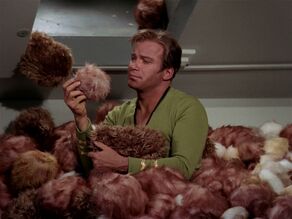In the classic 1967 Star Trek episode The Trouble With Tribbles (wiki), it only takes one tribble on the Enterprise and a few hours to produce waves of tribbles pouring out of the elevators and vents. Doctor “Bones” McCoy says that’s because the little furballs are basically “born pregnant.” Captain Kirk estimates that after three days on the ship, there could be hundreds of thousands of them squirming around. But Spock corrects him and announces that there are exactly 1,771,561 tribbles on board. He is exactly right because the writers of Star Trek knew how to work a calculator.
The problem, of course, in addition to the being born pregnant bit, is that there's a new generation every three hours:
So, how did Spock know how many tribbles were on the Enterprise at the end of three days?
If you suspect that some population is growing at an exponential rate (e.g., it doubles itself pretty quickly), there is a certain way to write that mathematically. In fact, per the author of this post at Nerdist, it’s easy enough to do so that he found half a dozen math teachers and communicators that have used tribbles to teach students about the concept.
I'm going to send you to the original post for a detailed explanation of the math, but it's pretty straightforward. Here's a graph extrapolating tribble population growth forward over an additional couple of days:



"He is exactly right because the writers of Star Trek knew how to work a calculator." At the time, the writers would not have had a calculator. More likely: slide rule.
ReplyDeleteSorry, you can't get that level of accuracy from a (normal, portable) slide rule. And there were indeed calculators readily available in '67, just not 'pocket' calculators; HP would not give birth to the '35' for another 4-5 years.
ReplyDeleteThe number Spock provides is for Space Station K-7, not the Enterprise. The station also began with more than one tribble.
ReplyDelete